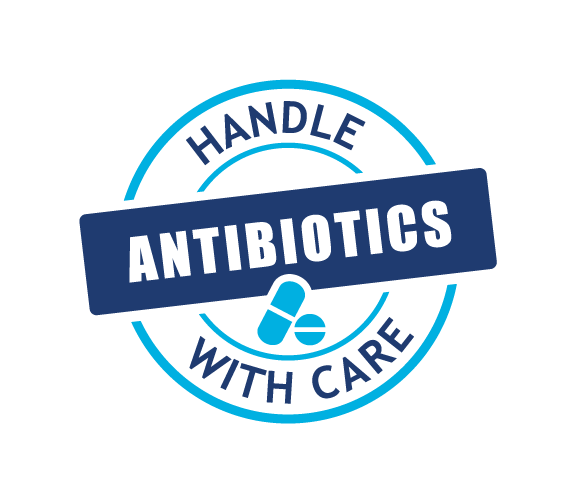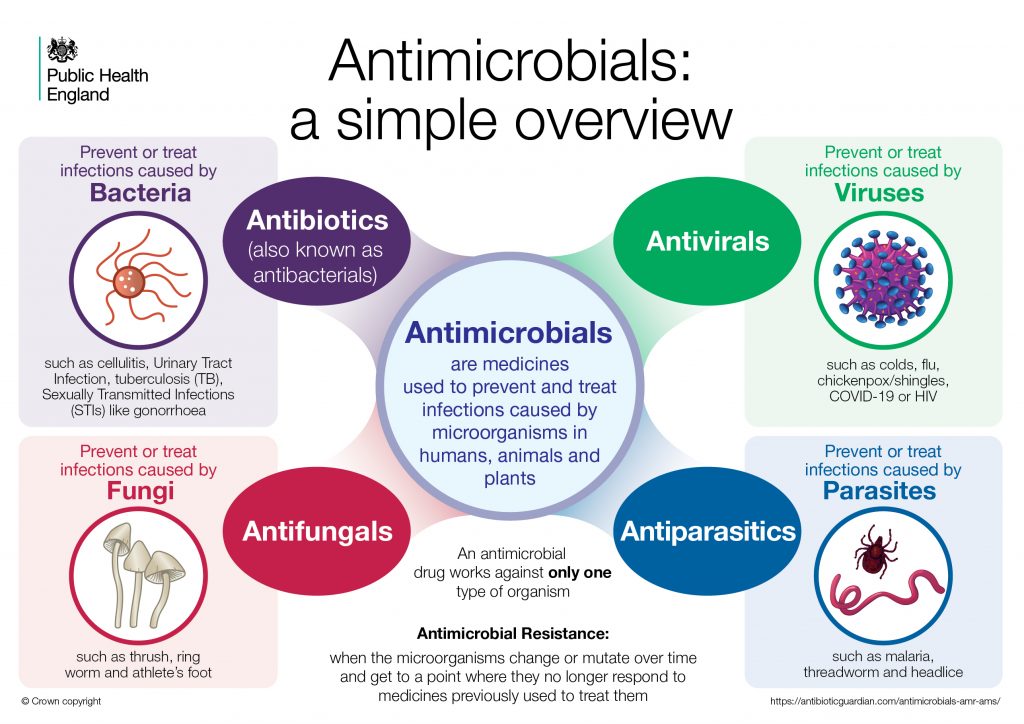What are microorganisms?
Microorganisms (living things too small to be seen with the naked eye) are all around us. Examples of microorganisms are:
- Bacteria
- Viruses
- Fungi
- Parasites
The majority are not harmful to us, and many are actually beneficial, for example we have them in our gut and they help with digesting food. A small number of microorganisms are harmful and can cause infections that make us ill.
What are antimicrobials?
An antimicrobial is an agent that kills microorganisms or stops them growing. Antimicrobials are used to prevent and treat infections in humans, animals and plants. Antimicrobials can be split into different classes depending on which microbes they target:
- Antibiotics (e.g. Penicillin) prevent or treat infections caused by bacteria
- Antivirals (e.g. Tamiflu) prevent or treat infections caused by viruses
- Antifungals (e.g. Canesten) prevent or treat infections caused by fungi
- Antiparasitics (e.g. Quinine) prevent or treat infections caused by parasites
What is antimicrobial resistance (AMR)?
AMR occurs when microorganisms change over time and no longer respond to antimicrobial agents. AMR can make infections harder to treat, increasing the spread of disease, severe illness and death (World Health Organisation fact sheet). AMR is a complex problem with many interconnecting factors that ultimately affects all of society.
Antimicrobial resistant microbes can be found everywhere in:
- people
- animals
- food
- plants
- the environment (water, air and soil)
Antimicrobial resistant microbes can spread from person to person or between people and animals, including from food of animal origin.
AMR actually occurs naturally, however the widespread misuse and overuse of antimicrobials has contributed to its acceleration and global spread. AMR is now recognised as one of the top 10 threats facing humanity by the World Health Organisation.
Combatting AMR will require a combined effort from many different sectors to reduce the use of antimicrobials and to develop new ones.
However, everyone can play a part in decreasing AMR by using antimicrobials responsibly. This is known as ‘antimicrobial stewardship’. Understanding how antimicrobials work, how resistance emerges, and what actions drive resistance, will enable everyone to play a role in antimicrobial stewardship.
Find out more about AMR in this animation
Watch how bacteria evolve antibiotic resistance in the laboratory
Find out about the research happening at Cardiff University to help understand and combat AMR.
What can you do to stop the spread of infections and fight AMR?

Practice good hygiene habits:
- Frequent hand washing with soap and water will remove microorganisms that could cause illnesses.
- Covering your mouth and nose with a tissue when you cough or sneeze helps to stop the spread of infections such as the common cold or flu. Throw used tissues in the bin and if you don’t have a tissue then cough or sneeze into your elbow, not your hands.
- Good food handling reduces the risk of getting ill from microorganisms carried on food. This includes washing your hands, washing fruit and vegetables, keeping raw and cooked meat separate, and ensuring food is properly cooked to eliminate harmful microbes.
- Staying home when unwell helps prevent the spread of infections.
Get vaccinated to strengthen your immunity against diseases caused by microorganisms.
Use antimicrobials responsibly:
- Remember that different types of antimicrobials treat different infections. If you have an infection caused by a virus (such as a cold or flu), then antibiotics will not work as they only treat infections caused by bacteria.
- Follow your Doctor’s Advice. Only take antimicrobials that are prescribed for you, and do not share your antimicrobials with other people. Take the correct amount, for as long as instructed, to make sure your infection is cured completely.
Spread the word! Tell others about the importance of using antimicrobials responsibly.
Microbiology and AMR links
Resources for older children and adults
Microbiology Society information about AMR from the Microbiology Society, a UK-based society promoting the study of microbes, their effects and practical uses
Antibiotic Guardian a Public Health England AMR awareness campaign
Antibiotic Research UK a UK charity with information about AMR and support for patients with antimicrobial resistant infections
STOP SUPERBUGS a British Society for Antimicrobial Chemotherapy awareness campaign
World Health Organisation information about AMR and the global action plan for tackling AMR
Resources for younger children
SUPERBUGS a fantastic bilingual (English/Welsh) website with interactive activities about microbes and AMR, co-produced by researchers and teachers
e-Bug a free educational resource from Public Health England about microbes and the spread, prevention and treatment of infection
e-Bug Art & Design the e-Bug resources under the category of Art and Design, information about microbes, AMR and ideas for artworks

